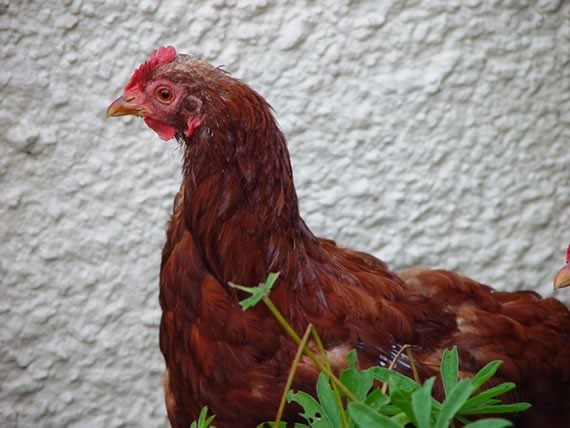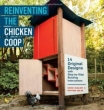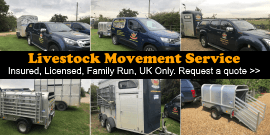Poultry Health and Wellbeing
For the most part, hens kept extensively, fed a good diet, cleaned out regularly and subject to some measures to control internal and external parasites are pretty healthy. However, as a conscientious poultry keeper you must familiarise yourself with the signs of a healthy bird, get used to handling them and check them over regularly.
A healthy hen will have bright eyes, glossy plumage, red comb, flat leg scales and no runny or smelly discharges from any orifice. She will be active and alert in her behaviour.
Moulting
Remember, hens moult annually, at the end of a laying cycle. At this time, the bird is tired and during moulting, the bird’s reproductive system will shut down to allow the body to build up reserves and new plumage i.e. egg laying will stop.
 A hen during the moult
A hen during the moult
Cocks in the moult will usually be infertile for the same basic reasons as hens. Pullets will usually lay for eleven months or so in their first season before moulting; the second season will be shorter and less productive but still good; after that, egg production will decline each year.
Some birds lose more feathers than others – some can be almost “oven ready” and can look quite off colour until the feathers start to grow back in. The feathers are always moulted in the same order – head and neck; back; breast; body; wings and finally, tail. Those that moult the most are reputed to be the best layers!
As the new feathers start to grow in, handle your hens with care as the new “stubs” or “pins” will be quite sensitive. It takes about seven weeks for the new feathers to fully mature and the moult is over when the flight feathers on the wings have grown back.
Moulting is natural at the end of the laying cycle, but stress can cause moulting at other times of the year. You might want to consider adding a vitamin and mineral supplement to the usual feed to give the birds a boost during the moult.
- Previous « Poultry Food & Drink
- Next Poultry Pests & Diseases »

About Rosemary Champion
Rosemary lives on a 12 acre smallholding in Angus, in the east of Scotland, where she keeps Ryeland Sheep, Shetland cattle and assorted poultry. She was destined to be a smallholder from an early age.
Further Reading
 Chicken & Eggs: River Cottage Handbook No.11 Mark Diacono |  Storey's Guide to Raising Chickens Gail Damerow |  A Beginners Guide to Caring for Ex-Batts Jo Barlow |  Reinventing the Chicken Coop Matthew Wolpe |  Chickens: The Essential Guide to Choosing and Keeping Happy, Healthy Hens Suzie Baldwin |
Smallholding shop
When you click links below and make a purchase, this may result in this site earning a commission from eBay.

Anti-Feather Pecking Spray 500ml
Anti-Feather Pecking Spray.… from £9.89 + p&p

Auto Drinker - Small Red
20 cm automatic… from £10.19 + p&p

Scaly Leg Spray 500ml
Net Tex Scaly Leg Spray.… from £9.52 + p&p

Polyprop Feed Scoop medium
1Kg plastic feed scoop. Ideal… from £1.10 + p&p
















